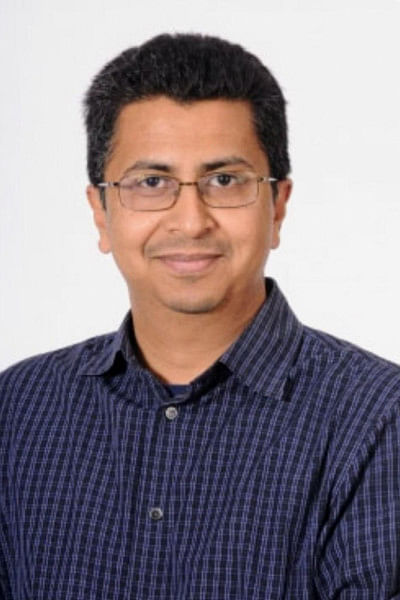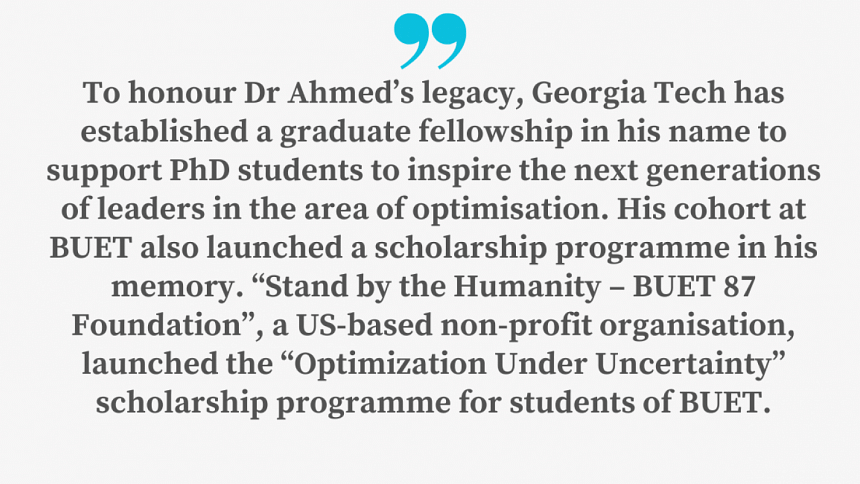Shabbir Ahmed Shuvo: An inspiration for future (and all) generations

Shabbir Ahmed Shuvo, a Bangladeshi scholar of international repute, has left his legacy for many generations to come. His untimely death three years ago created a void in the emerging field of stochastic optimisation theory, where Shuvo established his indelible mark within a very short span, but an incredibly frenetic life filled with unbounded achievements.
Shabbir Ahmed was the Anderson-Interface Chair and Professor in the H Milton Stewart School of Industrial and Systems Engineering (ISyE) at Georgia Institute of Technology, Atlanta, USA, when he passed away on June 19, 2019, after a short bout with cancer. He truly was a polymath, and his contributions to stochastic optimisation theory, methodology, algorithms, and their application furthered our knowledge and advancement in the field of energy, logistics and supply chain, chemical engineering, power system design and operations, and healthcare.
Shuvo was an alumnus of Bangladesh University of Engineering and Technology (BUET), where he became a lecturer in the Department of Engineering and Technology after he graduated in 1993. Soon after that, he enrolled in the graduate programme of the University of Illinois at Urbana Champaign where he received his MS and PhD in 1997 and 2000, respectively, in Industrial Engineering with a concentration in Operations Research. Accolades and recognition for his pioneering work in his field of expertise rapidly followed.
As a lifelong student of the ever-evolving discipline of decision-making under uncertainty, I can appreciate the challenges and scholarship that Shuvo faced when he started his career at Georgia Tech. Decision-making in every business sector – from energy distribution, transportation, and production planning, to finance, engineering design, and health care – involves decisions to be made in the presence of uncertainty. Shuvo's life is an example of his determination to continuously move forward and leave his imprint on a multitude of scholarly areas.
During his PhD studies, Shuvo conducted research work on multi-stage stochastic optimisation at the prestigious IBM's TJ Watson Research Center leading to his appointment as an assistant professor in the School of Industrial and Systems Engineering at Georgia Tech.
Shuvo achieved global recognition for his ground-breaking ideas from the earliest days of his academic career. He received the INFORMS Dantzig Dissertation Award (First Prize) in 2000. INFORMS is the leading international association for professionals in operations research, analytics, management science, economics, behavioural science, statistics, artificial intelligence, data science, applied mathematics, and other relevant fields. He subsequently received the CAREER Award from the National Science Foundation in 2002; the IBM Faculty Award in both 2002 and 2005; the 2017 INFORMS Computing Society Prize; and the 2018 Farkas Prize from the INFORMS Optimization Society for outstanding contributions to the field of optimisation. In 2014, he was appointed both as an ISyE Stewart Faculty Fellow and a College of Engineering Dean's Professor. He was a Senior Member of the Institute of Electrical and Electronics Engineers (IEEE) and an INFORMS Fellow.
In addition to academic rigour, Dr Ahmed was highly regarded as a gracious collaborator and mentor. Over the course of his short 19 years of career, he advised 27 PhD students and several post-doctoral students. His former PhD students are well-placed in academia as well as industries, and remember him fondly.

"Shabbir's expertise had both depth and breadth," noted Georgia Tech's A Russell Chandler III Chair and Institute Professor George Nemhauser, who worked closely with Ahmed on optimising inventory and logistics problems. "He could work in so many areas, and his impact was large as a result. While some people are experts in theory and others in application, Shabbir put it all together," Nemhauser added.
"Shabbir was a superb scientist and person, he had many things to contribute to the world, and he left us way too early. Words cannot express the sadness I feel," said Dr Dimitris Bertsimas, Boeing Leaders for Global Operations Professor, MIT Operations Research Center.
To honour Dr Ahmed's legacy, Georgia Tech has established a graduate fellowship in his name to support PhD students to inspire the next generations of leaders in the area of optimisation. His cohort at BUET also launched a scholarship programme in his memory. "Stand by the Humanity – BUET 87 Foundation", a US-based non-profit organisation, launched the "Optimization Under Uncertainty" scholarship programme for students of BUET. The mission is to carry on Dr Shabbir Ahmed's vision and commitment to excellence, and to inspire innovative research and worthy achievements. It will motivate students of acumen to pursue higher studies and propel young minds in Bangladesh to embark on their journey ahead with indomitable spirit and fierce efforts. His family, friends, and admirers hope that the scholarship will enable the recipients to make their imprint in the global paradigm of "Unbounded Achievements", which was Shuvo's life-long guiding principle.
Dr Abdullah Shibli is an economist and works for Change Healthcare, Inc., an information technology company. He also serves as senior research fellow at the US-based International Sustainable Development Institute (ISDI).

 For all latest news, follow The Daily Star's Google News channel.
For all latest news, follow The Daily Star's Google News channel. 







Comments